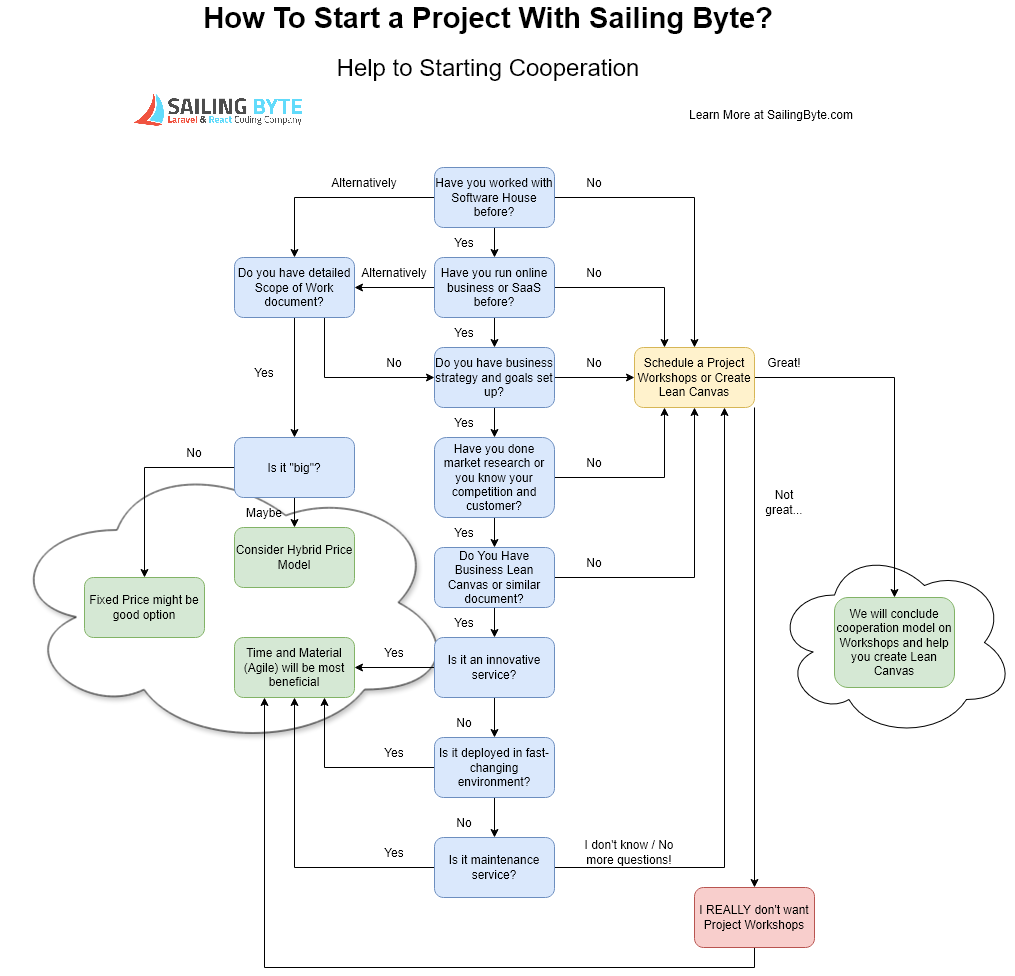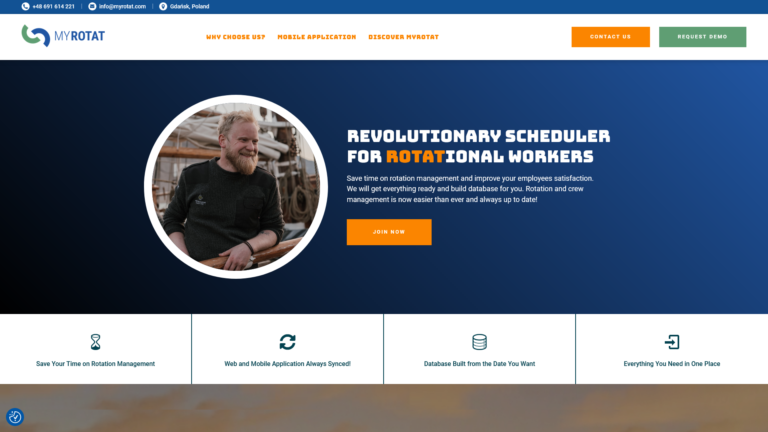The pricing model offered for your project agreement depends on many factors, but it ultimately comes down to defining the project scope. For smaller projects or startups the requirements might be predictable enough to give you a precise estimate. However, for larger, innovative projects, there can be much more uncertainty, so non-fixed pricing models might be proposed. Choosing the right pricing model for working with a software house is a crucial decision that must be carefully thought through, especially considering that software development is a unique service—not a repeatable product. The two most common pricing models are “Fixed Cost” and “Time and Materials.”
Note that in this article I am only comparing different pricing models in terms of cooperating with software house, but in each category you will also find links to articles where pricing models are described in more details in SaaS pricing aspect.
Before you Assess Development
It should be quite intuitive that before you assess something, you need as many details as you can get. Also your knowledge (in our case business or SaaS) should be organized, precise and fatfruh. If you won’t be precise enough in your business description, then assessment cannot be precise as well which may lead to misleading assessments and missing business goals. Especially, if you haven’t worked with software house before it is most desired that you learn a bit how software house works. Because of that, we always propose our customers to have project workshops before starting the project. On our workshops we do not only talk about development of the product but also all the things around the product such as marketing, business planning, testing and so on. Also, you get all the legal rights to the materials created during the workshops so it is a low cost possibility to enhance your business idea.
There is another aspect of the project workshops as well: It helps you to determine what your project budget is or what it should be. You can learn more about why we are asking about development budget in this article – below we will only discuss pricing models. It is important to know your budget, because it also helps us and you to actually select best in your case pricing model.
Fixed Cost Development Pricing Model
In this model you are asking software house for one price (as precise as possible) for exactly defined scope of work. Plan can also clearly state what are the milestones and expected release dates for each milestone and ordered items. With that information software house will proceed to start the estimation process to provide fixed pricing for ordered work. Note, that software house will need to verify during the process if order of items is proper, if there are no missing technical elements, if elements are described well enough and if expected dates are actually realistic. Sometimes changes proposed by software house will be substantial, especially if you are not familiar with IT project management. Because of this, in assessement will always be included some risk factor, which will impact overall pricing.
Advantages of fixed price model
- You know the project’s cost and timeline from the outset, making it easier to budget and plan.
- Minimal Client Involvement. Once requirements are set, the software house can proceed with limited need for further input.
- A well-defined scope helps avoid deviations and keeps the project focused.
- With a clear contract, administrative and budgeting needs are simplified.
- You know price and time for project from the very beginning. But it might be misleading, because you know time and price for project as it is defined and it lacks flexibility if anything to project requirement changes
Disadvantages of fixed price model are
- Minimal margin for adjustments, testing, or scope modifications during development.
- No scope for additional functionalitie. Any added features, even those that make sense mid-project, would require renegotiation.
- Estimating precise timelines and costs is challenging, and there’s a risk of underestimating complexities.
- No margin for tasks that by definition are badly defined.
- Possible problems with estimation processes. There is also some uncertanity, that need time and money margin – and someone needs to pay for that margin.
- Lack of long term perspective (for example, what about support and development after release?). Also, software house that is presented only with short-term goals cannot propose better solutions if possible, while they could if they knew long-term goals
- Problem with defining “proper” quality level of the end product. You can overcome it by defining scope and methodologies of tests, but you are constrained by test definitions.
- Lack of flexibility limits opportunities to adopt emerging technologies or methodologies that could improve the outcome.
Time and Materials Development Pricing Model
The Time and Materials (T&M) model treats the software house as a potential medium or long-term partner in product development and maintenance. While you can change providers later, a close, ongoing relationship can improve efficiency and understanding, with both sides focusing not just on “task delivery” but on “building the best product for end users.”
There are many ways to describe business idea, but “Why, How, What” is one of the easiest. It is important for team to understand background of the project and this method helps with it. For “Why How What” approach you have to specify at the very beginning:
- WHY you want to develop your product (industry/business specification, problem you are solving).
- HOW you want to achieve your business goals (how you want to solve issue, how you want to scale etc.) .
- WHAT is your desired technology (web or mobile app , custom software solution, certain technology/coding language etc).
This information is necessary for software house to help you create a proper plan for your product development using our experience on the software development market. Another simple yet effective methods of describing business are Lean Canvas and Business Model Canvas. Once software house understands your needs (or even better – your end users needs) developers can start building either the prototype or MVP (minimum viable product) version of your product by applying iterative frameworks such as Scrum or KanBan.
You’ll become the Product Owner (or delegate this role while retaining a Stakeholder role), staying in close contact with the development team. This structure enables you to:
- Adjust project scope and direction at almost any stage.
- Regularly review progress, providing feedback to ensure alignment with end-user expectations.
- Continuously assess the product’s current state, making necessary changes as required.
Ultimately, you will be charged only for:
- Hours spent by team members on your product/project development (TIME)
- All necessary technology costs connected to developing your product in certain (accepted by You) direction (MATERIALS)
Notice lack of margin. It is not needed here, but let’s be fair – it’s not because there is no risk, but because it is resolved as development goes on. This is also because developers only do things on the go that are most important at the very moment. Also it is worth noting, that testing aspect (for example required unit test coverage percent) can be changed on the go, adjusted to current users behavior or even adapted to different parts of the system.
Advantages of Time and Materials model
- Extremely low time-to-market due to early MVP release which enables gathering user feedback.
- Agile frameworks allow easy modifications in response to feedback or new discoveries.
- Continuous testing and refinement improve the product’s final quality.
- Agile iterations allow for user-centric adjustments that directly address evolving requirements.
- Costs are directly linked to time and resources spent, offering transparency and value alignment.
- Agile frameworks will give you chance to gather feedback from end users and easily adjust scale, scope and direction of your product development.
- Highest quality of end product due to continuous improvements.
Disadvantages of Time and Materials model
- Requires more frequent client involvement to stay on course.
- Relies on a strong, trust-based relationship with the software house.
- The end cost can vary, but may be mitigated through a subscription model for predictable budgeting.
- Without clear milestones, there’s a risk of expanding requirements without added resources.
- Agile development requires familiarity with iterative planning, which can be challenging for newcomers.
Hybrid Pricing Model – Looking for Balance
You can encounter other pricing models, but essentially they will originate either from Fixed price or Time and materials. Especially interesting might be for you to find something in between those two – in such case you can get a fixed price, but provided in certain pricing range. Such approach is often used by us especially on early stage, and ensures that both parties understand more-or-less project scope and goal. Such assessment can also be used to at the very beginning before narrowing down scope to required MVP, or for early planning different stages of the project.
Advantages of hybrid pricing model
- You can get early estimate of the project size without describing every detail of the project.
- It helps to identify if there are any technologically pain-points.
- You can find points that are “nice to have” but “for that price can be postponed after MVP” which reduces your initial launch cost.
Disadvantages of hybrid pricing model
- Requires preliminary sessions to refine the scope and pricing range.
- Provides only a price range rather than a fixed figure.
Software House Pricing Models Comparison
I have prepared table and schema so you can easier make a decision when selecting best-fit pricing model for cooperation with software house.
Project With Software House – Table
| Criteria | Fixed Price Model | Time and Materials (T&M) Model | Hybrid Pricing Model | Dedicated Team Model |
|---|---|---|---|---|
| Definition | One predetermined price for a clearly defined scope of work with specific milestones and deadlines | Client pays for actual hours spent on development and necessary technology costs | Combines elements of both fixed price and T&M models to balance predictability with flexibility | Client selects and directly pays individual team members working on their project |
| Risk Distribution | Development partner bears most financial risk; client risks getting exactly what was specified even if better solutions emerge | Risk is shared, with client bearing cost risk and development team having less pressure to cut corners | Balanced risk distribution, with specific aspects locked in while others remain flexible | Client assumes most of the risk and responsibility for project success |
| Flexibility | Minimal margin for adjustments or scope modifications; changes require formal renegotiation | Maximum flexibility to adapt to changing requirements or market conditions | Moderate flexibility with defined parameters for changes | High flexibility in team composition and project direction |
| Client Involvement | Intensive during requirements phase, minimal during development | Active participation required throughout the project with ongoing decision-making | Moderate involvement with scheduled checkpoints for decisions | Highest level of involvement, essentially managing the team directly |
| Budget Predictability | High predictability (assuming no scope changes) | Lower predictability but high transparency into where money is spent | Moderate predictability with defined upper limits | Variable predictability depending on team efficiency |
| Best Suited For | Short-term projects with well-defined requirements and limited budgets | Projects needing agility, ongoing development, or where requirements may evolve | Medium-sized projects where some flexibility is needed but budget constraints exist | Long-term projects requiring deep integration with client’s team or specialized expertise |
| Key Advantages | – Budget certainty from the outset – Minimal client oversight required – Clear deliverables and deadlines – Simplified administrative needs |
– Low time-to-market with early MVP release – Easy modifications in response to feedback – Continuous testing and quality improvement – Transparency in costs |
– Provides flexibility within budget constraints – Helps identify technical pain points early – Can prioritize features based on value – Balances certainty with adaptability |
– Maximum control over team selection – Direct oversight of development process – Team can be scaled according to needs – Integration with internal teams |
| Key Disadvantages | – No scope for additional features without renegotiation – Risk premiums typically add 20-30% to cost – Quality may be sacrificed to meet deadlines – Lack of long-term perspective |
– Unpredictable final costs – Requires more frequent client involvement – Relies on trust-based relationship – May expand beyond initial requirements |
– Requires preliminary scoping sessions – Provides only a price range rather than exact figure – Potential for deadline slippage – More complex to manage |
– Added management responsibility – Individual payments to team members – Higher administrative overhead – Requires project management expertise |
| Pricing Structure | Single upfront price covering all defined deliverables | Hourly/daily rates multiplied by actual time spent, plus material costs | Initial fixed price component with variable elements or capped T&M | Monthly salaries or hourly rates for each team member |
| Quality Considerations | May incentivize meeting minimum requirements rather than exceeding them | Allows for quality refinement throughout development | Quality can be adjusted based on project priorities | Quality depends on team expertise and client management |
Project With Software House – Schema

When Fixed Price is Best
- Small projects or websites with predictable and manageable functionality.
- Budget-conscious projects that will need minimal maintenance or updates post-release.
- Projects built on established platforms (e.g., WordPress) that are straightforward to implement.
- Initiatives with pre-defined, UX-tested user scenarios and graphic design.
- Extremely pre-defined or smaller software solutions.
When Time and Materials is best
- Development of complex products and solutions that are now in early stage but are expected to evolve in long term.
- Products that have to be continuously developed and maintained.
- Startups of high uncertanity of how to actually solve a problem or what approach would be best for users.
When Hybrid Model is best
- You have general idea for the project but you don’t know the details.
- You’re unsure if elements are missing from your initial plan.
- You want expert input on technical aspects that you’re unfamiliar with.
- You aim to validate that the software house understands the project’s vision and objectives.
Importance of Project Business Workshops
As you can see it is quite a big of importance to select proper pricing approach, and main issue for seleting one of those is uncertanity. Of course, there are ways to reduce uncertanity, and one of those is workshops. Such workshops are meetings with developers so both you and dev team can better understand what software is about and what issues can you expect on the go. You can use our expertise to verify idea against our technical and business knowledge and test out if like communicating with us. This is beneficial for all sides, because:
- Having workshops at the begginning is essetially a low-cost pre-start for your SaaS business.
- All materials (like product goal, view prototypes, database structure etc) are yours to keep:
- If you don’t like working with certain software house, you can take workshop results and move to another software house.
- You can reduce risk if at the workshop level SaaS idea is proven to be non-deliverable for any business or strategic reason.
- You can use such materials to get approval for more funding.
- You get better understanding on technological boundaries of the project.
- Clarity on the technological and business aspects of the project.
- Opportunity to establish rapport and test communication compatibility.
More Questions About Starting Project
First o all, there was a lot of talking about budgeting – if you would like to start working with us, we would love to know your SaaS budget. Providing estimated budget for the project helps a lot with assesment and with selecting proper resources to complete project.
Secondly, I understand that this article – even though it’s detailed – might not answer all your questions. In such case, just contact us using contact form below and we will arrange meeting to discuss your project further. Also, if you strive for more knowledge about product ownership, project management or agile methodologies, you should certainly see other articles because there is quite a bit of knowledge in there and you should always look for more knowledge. Hope to hear from you soon and turn new idea into solution together!




